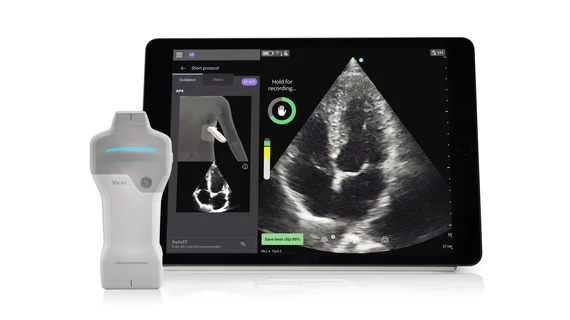GE Healthcare launching new AI software for handheld ultrasound system
GE Healthcare has announced the upcoming launch of new artificial intelligence (AI) software compatible with the company’s Vscan Air SL handheld ultrasound system. The new offering will make its debut at ACC.2024, the upcoming annual meeting of the American College of Cardiology.
Caption AI was designed to deliver guidance in real time that helps operators capture the most helpful images possible. In addition, it automatically calculates a patient’s left ventricular ejection fraction, ensuring any potentially troublesome findings are immediately identified. This was the kind of integration GE Healthcare had in mind back in February 2023, when the company acquired AI specialists Caption Health. Vscan Air SL, meanwhile, is a handheld ultrasound system developed for quick cardiac and vascular evaluations. It includes both a linear array transducer and a sector-phased array transducer.
“The integration of Caption AI with the Vscan Air SL handheld ultrasound opens an entirely new chapter for cardiac screening. This technology empowers users with guidance and tools for high quality ultrasound scans and supports earlier detection of cardiac disease,” Roland Rott, president and CEO of ultrasound for GE HealthCare, said in a prepared statement. “The strategic acquisition of Caption Health in 2023 continues to expand the capabilities of our products and solidifies our leadership in ultrasound and the emerging AI landscape.”
“With the increase of cardiovascular disease and shortage of sonographers around the globe, innovations like the Vscan Air SL with Caption AI are hugely transformative in cardiac care, supporting rapid and confident assessments at the point of care,” added Jordan B. Strom, MD, MSc, a cardiologist and imaging specialist with Beth Israel Deaconess Medical Center familiar with the technology. “AI guidance has enormous potential in ultrasound due to its ability to guide experts and relatively new users in retrieving diagnostic-quality information to make timely and accurate decisions and get patients on the right path sooner.”

